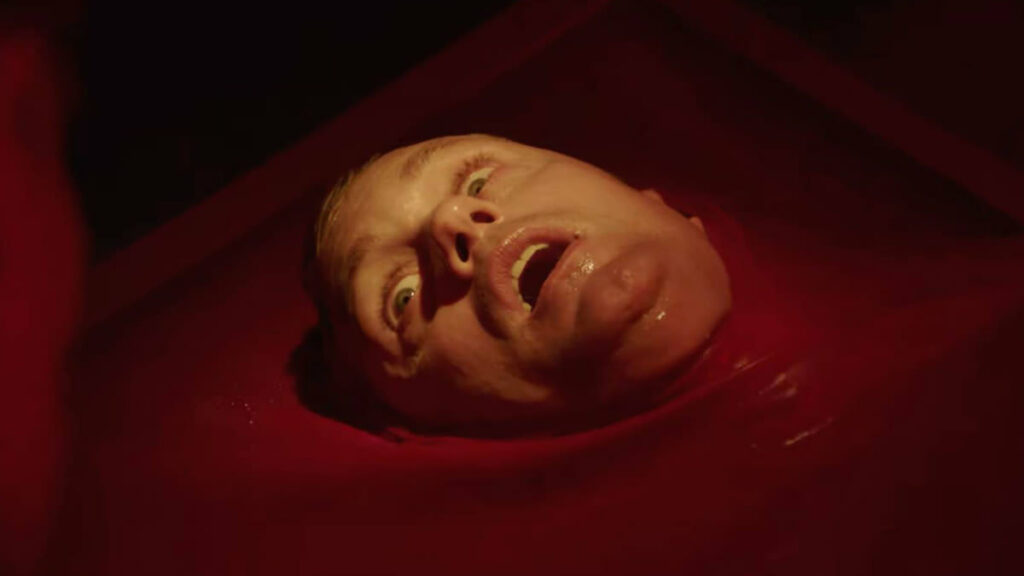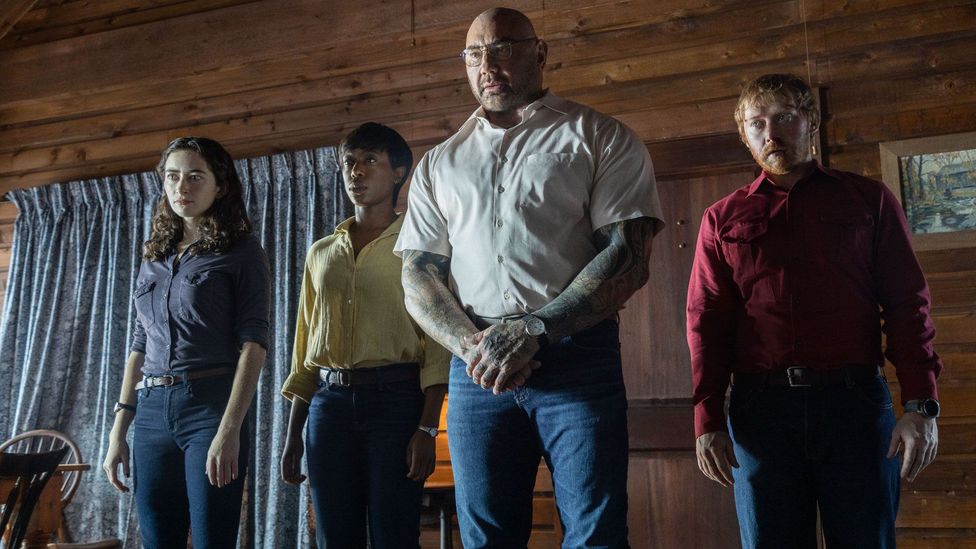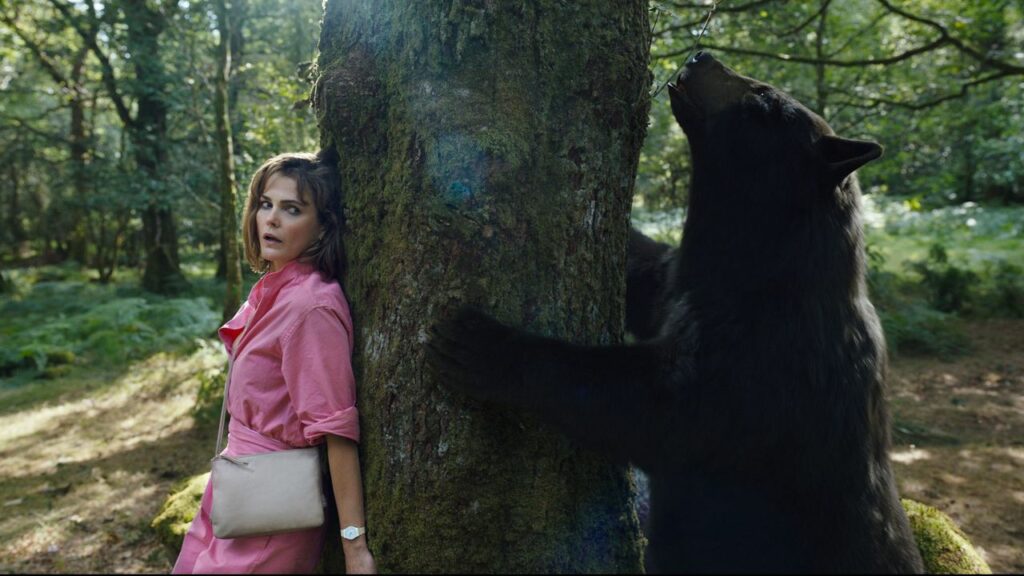

We go through three of the big R-rated movies of the start of the year to decide the good and the bad
It’s been a surprisingly busy start to 2023 for the movies. As usual, horror was the first to get things rolling with original sensations like M3GAN and Skinamarink while the Tom Hanks-starring comedy drama A Man Called Otto also made decent bank at the box office. Even 80 for Brady has been doing well! And as usual, Marvel scored a huge opening weekend with their new superhero adventure, Ant-Man and the Wasp: Quantumania.
We’re gonna talk about the latest films from a pair of visionary directors, David Cronenberg and M. Night Shyamalan. Infinity Pool and Knock at the Cabin were decent hits when they were released in theaters this year and are now available on digital. There’s certainly a good bit to go over, as both are tackling some rather deep themes with their own distinct styles to varying degrees of success. Minor spoilers for both films follow.
In the 2020 film Possessor, Brandon Cronenberg (son of David Cronenberg) presented us with a riff on the soul draining feeling of work and our unhealthy relationship with our jobs. While those ideas are usually explored through workplace comedies, Cronenerg created a sci-fi thriller with grotesque splashes of horror. The film’s greatest strength is in its originality; the story follows a body-possessing assassin (played by Andrea Riseborough) losing touch with reality (and her family) due to the constant demands of her job.
With Infinity Pool, the writer / director is wading into a similar well of existential dread and thousand-yard-stare mental states in an equally as fascinating story. The film follows a rather pitiful man named James Foster (Alexander Skarsgård). He’s a novelist with only one novel to his name, having spent several years now living off the money of his wife, Em (Cleopatra Coleman), who comes from wealth. The two are vacationing at a swanky seaside resort when they come into the crosshairs of mysterious couple Gabi (Mia Goth) and Alban (Jalil Lespert), who invite them out beyond the gates. A lot of trouble ensues.
What we come to learn to learn is that this particular (fictional) country is very unforgiving when it comes to criminal activity, unless of course, you have the right kind of money. The government is willing to let tourists pay their way out of even the most heinous of crimes through a special program – they clone the wrong-doer and punish the clone in their place. It’s made the resort a bit of a haven for a group of rich and hedonistic foreigners, and Gabi and Alban attempt to bring James into the fold and join them in their voyeuristic abuses of the system.

Infinity Pool is ultimately a study into just what kind of person James really is. When he witnesses the brutal execution of his own clone, the camera focuses on James’ face as it shifts from fascination to grotesque delight. When he’s pressed later on whether or not he thinks he may actually be the clone and the original was killed, his reply is simply “I can only hope.” James is an exceptionally sad and self-loathing individual, and his self-imposed degradation at the hands of the sadistic Gabi and her cohorts only sinks him lower and lower. I’m glad to finally see some true representation for men like me up on the big screen!
Those hoping for happy endings will have to look elsewhere; Cronenberg’s latest is a pretty bleak affair. There are plenty of tales of despair and hopelessness that still manage to be compelling, but much like Possessor, I left Infinity Pool feeling rather cold to it all despite its strong ideas and great performances. Maybe that coldness is part of the point; I do overall think this is a solid film with some standout moments and I enjoyed it more thoroughly than Possessor. Oddly enough, I wish Cronenberg would get a bit more plotty and a little less artsy with his stories.
M. Night Shyamalan doesn’t need much of an introduction, but for those who wrote off the iconic filmmaker after the disasters of The Last Airbender and After Earth, I highly recommend his more recent work. The Visit and Split are both excellent, Glass is as bold as Shyamalan has ever been, and 2021’s Old is like a feature-length Twilight Zone episode. His latest is Knock at the Cabin, based on the novel by Paul G. Tremblay. Its plot features apocalyptic stakes yet the film itself is a small and tense thriller set entirely in a single location, that of course being the titular cabin.
Knock at the Cabin tells the story of a small tight-knit family looking to spend some time away from civilization. Eric (Jonathan Groff), his husband Andrew (Ben Aldridge), and their daughter Wen (Kristen Cui) are vacationing at a remote cabin when they’re suddenly faced with an increasingly bizarre yet no less nightmarish scenario: Four strangers (Dave Bautista Nikki Amuka-Bird, Abby Quinn and Rupert Grint) brandishing various homemade weapons arrive on their doorstep and hold the family hostage. But they’re not here to harm the couple or their daughter, instead, they’re here to kill each other.

The visitors have come with a dire warning: Someone in the family must be willingly sacrificed or the end of the world will ensue. Every time they refuse to make a choice, the visitors will kill one of their own, setting off a new apocalyptic event until there’s nothing left. What Shyamalan has crafted here is like a strange reversal of a home invasion setup, where the clock isn’t ticking for our heroes but for everyone else. The threat of bodily harm is only really directed towards the apparent antagonists.
That certainly makes for a psychological conundrum and the film is at its best when it leans into those aspects. You’re right alongside Eric and Andrew as they frantically try to deduce whether these strangers are actually telling the truth or are just a group of deranged suicidal cultists, with the screenplay placing various clues and misdirects along the way to keep everyone on their toes. Your ultimate judgement about the film will obviously depend on how you feel about its ending (in true Shyamalan fashion its had audiences divided) but the ride there is fraught with genuinely gripping tension.
That said, I was still a bit frustrated by Knock at the Cabin by its end. It’s a family story at its core, with this particular family having to make a truly unfair and impossible decision. The real dilemma isn’t whether the apocalypse is happening or not, but whether Eric, Andrew and Wen – three people who have faced nothing but adversity and animosity from the world most of their lives – can consider humanity as something worth saving. That’s a pretty profound idea to play with, but one that winds up clashing with the practicalities of the actual plot at hand. It’s a messy allegory.
Meanwhile, themes and metaphors are of absolutely no consequence to a movie like Cocaine Bear. The legend of the real-life Cocaine Bear has been known across the internet for years. An American black bear stumbled across and ate millions of dollars worth of smuggled cocaine in the Georgia wilderness back in the 80s; a funny enough story on its own (besides the fact that the drugs are likely what killed the bear) that has now been expanded into a fantastically gory and ludicrous Hollywood movie.

Directed by Elizabeth Banks and written by Jimmy Warden, Cocaine Bear concocts a fictional story surrounding what may have happened after that bear ingested its weight in blow. The movie strings together a whole bunch of characters that cross paths with the deadly bear as well as each other, including a mother (Keri Russell) in search of her missing kid (Brooklyn Prince), a park ranger (Margo Martindale), and a pair of criminals (O’Shea Jackson Jr. & Alden Ehrenreich) looking to retrieve the missing drugs.
The film feels increasingly slipshod, as if everyone thought that the silly concept alone would do most of the work for them. There are some solid gags in here, the best of them being a wildly gruesome ambulance chase sequence, but so much of it makes little sense even by its own rules. Sometimes the cocaine immediately makes the bear violent, sometimes it doesn’t change its demeanor much at all. The same goes for the human characters who either intentionally or accidentally breathe in the white powder – it hardly seems to affect them much at all, even if they’re children!
Cocaine Bear also suffers from not really knowing exactly what kind of movie it wants to be. It’s constantly shifting between being a kooky and gory creature feature, a lighthearted crime caper, and an absurd comedy. There’s certainly a way to blend that all together in a natural way, but the movie never manages to figure out a true cohesiveness or commit to any of its choices. It feels like there’s a much better and funnier version of this story somewhere in here, one that understands how to maintain the kind of heightened world that a title like Cocaine Bear basically demands.
That all probably won’t matter much to those looking for some dumb easy laughs, which the film is still able to deliver on plenty. It goes by quick and offers some fun performances, most notably from Martindale and Ehrenreich, as well as several impressively mean-spirited kills. Even if it’s not really my cup of tea, I’d still love to see more movies like Cocaine Bear come to theaters. We need more ridiculous big swings like it.
Infinity Pool and Knock at the Cabin are now available on digital. Cocaine Bear is currently playing in theaters.